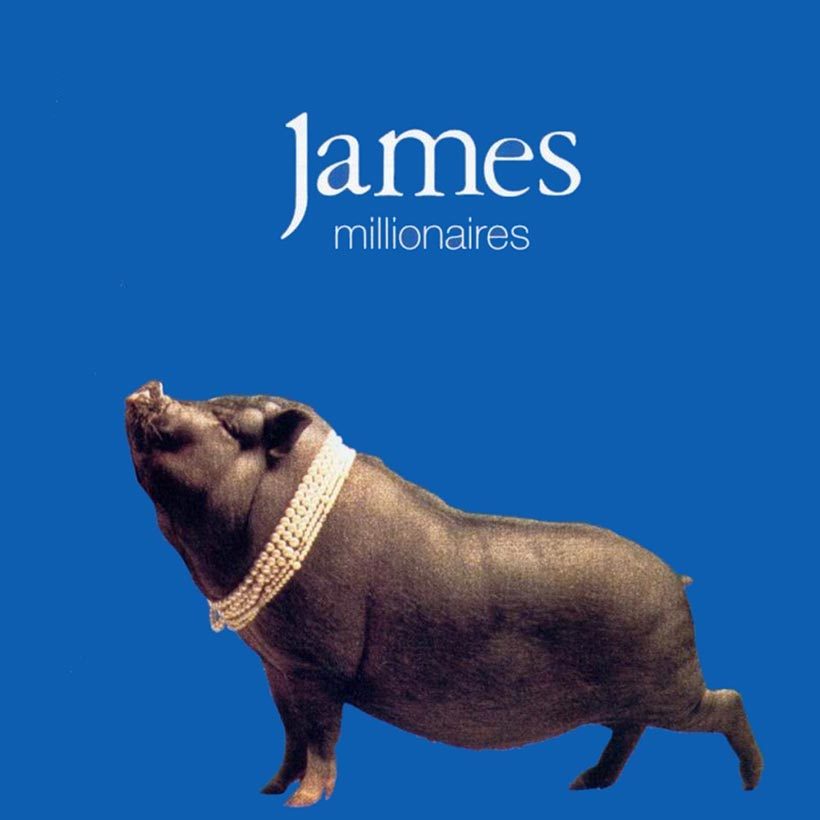‘Millionaires’: How James Topped Up Their Rich Artistic Legacy
Produced by Brian Eno, James’ ‘Millionaires’ album lived up to their ambitions of being commercial, interesting, and different.

After a three-year hiatus during the mid-90s, James roared back into contention with 1997’s Whiplash. Assisted by the emotive UK Top 10 hit “She’s A Star,” the album yielded a gold disc, while the following year’s The Best Of went double-platinum and even denied Titanic: Music From The Motion Picture the No. 1 spot in the UK during Oscars week. However, while both these titles proved the band was undergoing a sizable resurgence, their cumulative success meant the pressure was on when the enduring Mancunian alt-pop outfit came to creating their eighth album, Millionaires.
Listen to Millionaires on Apple Music and Spotify.
“That success created an expectation”
“We were aware that last year’s success had created an expectation of this record,” multi-instrumentalist Saul Davies said in a 1999 press release. “The songs were written just as [The Best Of] was kicking off and it generated a lot of energy.”
“The optimism of the last year did give the band a real lift,” vocalist Tim Booth confirmed, “but there were a lot of problems and conflicts at the same time which hadn’t been resolved. Those tensions are all there in the songs as well.”
That at least seven tracks which made the cut for Millionaires were unveiled live on James’ arena tour of December 1998 shows that the band’s creativity was at its peak as they gigged in support of their hits collection. Accordingly, getting their freshly-minted songs down on tape was the priority early in 1999. To achieve this, James turned to Brian Eno, who had previously produced 1993’s sublime US breakthrough, Laid, and its critically-acclaimed follow-up, Wah-Wah.
“We derived enormous encouragement from him being there”
“On some songs, he had very fixed ideas, and with others he was prepared to roll with the flow,” Tim Booth said of reconnecting with Eno for the Millionaires sessions. “Really, we derived enormous encouragement just from him being there.”
Undeniably, Eno’s presence is easily detectable on Millionaires’ more leftfield moments. The otherworldly, Sinead O’Connor-enhanced “Vervaceous” emerged from an intensive, Wah-Wah-esque jam, while the low-key yet powerful “Hello” would have been right at home on Eno and U2’s Passengers collaboration, Original Soundtracks 1. The ambitious anti-war anthem “Afro Lover,” meanwhile, melded the motorik intensity of Neu! with an African vibe redolent of another influential Eno title – his David Byrne collaboration My Life In The Bush Of Ghosts.
Crucially, though, while Millionaires showed us that both band and producer were prepared to embrace the quixotic, they were equally keen to bring some of the most accessible pop songs of James’ career to fruition. Tim Booth’s team had rarely sounded as confident as they did riding the swaggering groove of the opening “Crash,” while the infectious “I Know What I’m Here For” and the unashamedly romantic “Just Like Fred Astaire” had “hit single” stamped all over them.
“Among the great British rock records of the decade”
Both of those songs made good on their promise. Released in July 1999, between triumphant festival slots at Scotland’s T In The Park and the Guildford Festival, “I Know What I’m Here For” peaked at No.22 in the UK while enjoying heavy rotation on MTV in the US. The majestic “Just Like Fred Astaire,” meanwhile, rose to No. 14 at home, just before Mercury issued Millionaires, on October 13, 1999.
Despite high hopes, the album failed in its quest to dislodge the revised, international edition of Shania Twain’s bestselling Come On Over from the top of the UK Top 40, but it peaked at an impressive No. 2. It also garnered some rave reviews, including one from Q (“If there’s any justice Millionaires will be cited alongside the great British rock records of the decade”) which bracketed it with landmark titles such as The Verve’s Urban Hymns and Radiohead’s OK Computer.
Millionaires demonstrated that James had once again raised the bar. The record’s subsequent chart performance (16 weeks on the UK chart, with a gold disc to follow) showed they had achieved what Tim Booth referred to as “striking a good balance between being commercial and being interesting and different,” while a celebratory tour of UK arenas that December proved exactly why these Mancunian stalwarts still ranked among Britain’s most respected alt-pop acts as they geared up for the 21st century.












